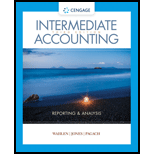
Concept explainers
State four potential benefits to the lessee of leasing versus purchasing an asset.
Explanation of Solution
Lease: Lease is a contractual agreement whereby the right to use an asset for a particular period of time is provided by the owner of the asset to the user of the asset. The owner, who possesses the asset, is termed as ‘Lessor’ and user, to whom the right is transferred to, is termed as ‘Lessee’.
State four potential benefits to the lessee of leasing versus purchasing an asset:
The four potential benefits of the lessee include the following benefits:
1. Strategic benefits: Leasing the assets will be cheaper as compared with the purchase of assets.
2. Risk benefits: Leasing the asset will reduce the risk of obsolescence of an asset for the lessee.
3. Financing benefits: In some cases, for leasing the asset, the lessee will get 100% finance. Thus, the lessee will acquire the asset by making a lower down payment. Sometimes for leasing, the interest rate will be lower than the loan interest rates.
4. Tax benefits: The lessee can deduct the lease payments and can write off full cost of the asset. It will results in lower taxable income.
Want to see more full solutions like this?
Chapter 20 Solutions
Intermediate Accounting: Reporting and Analysis (Looseleaf)
- I mistakenly submitted blurr image please comment i will write values. please dont Solve with incorrect values otherwise unhelpful.no aiarrow_forward1) Identify whethere the company is paying out dividends based on the attached statement. 2) Describe in detail how that the company’s dividend payouts have changed over the past five years. 3)Describe in detail the changes in “total equity” (representing the current “book value” of the company).arrow_forwardWhich is not an objective of internal controls?A. Safeguard assetsB. Improve profitsC. Ensure accurate recordsD. Promote operational efficiencyneed helparrow_forward
- Which is not an objective of internal controls?A. Safeguard assetsB. Improve profitsC. Ensure accurate recordsD. Promote operational efficiencyno aiarrow_forwardCan you solve this general accounting problem using appropriate accounting principles?arrow_forwardWhich is not an objective of internal controls?A. Safeguard assetsB. Improve profitsC. Ensure accurate recordsD. Promote operational efficiency no aiarrow_forward
- Need Answer with general Accounting Solving Methodarrow_forwardPlease provide the correct answer to this financial accounting problem using valid calculations.arrow_forward20 Nelson and Murdock, a law firm, sells $8,000,000 of four-year, 8% bonds priced to yield 6.6%. The bonds are dated January 1, 2026, but due to some regulatory hurdles are not issued until March 1, 2026. Interest is payable on January 1 and July 1 each year. The bonds sell for $8,388,175 plus accrued interest. In mid-June, Nelson and Murdock earns an unusually large fee of $11,000,000 for one of its cases. They use part of the proceeds to buy back the bonds in the open market on July 1, 2026 after the interest payment has been made. Nelson and Murdock pays a total of $8,456,234 to reacquire the bonds and retires them. Required1. The issuance of the bonds—assume that Nelson and Murdock has adopted a policy of crediting interest expense for the accrued interest on the date of sale.2. Payment of interest and related amortization on July 1, 2026.3. Reacquisition and retirement of the bonds.arrow_forward
 Intermediate Accounting: Reporting And AnalysisAccountingISBN:9781337788281Author:James M. Wahlen, Jefferson P. Jones, Donald PagachPublisher:Cengage Learning
Intermediate Accounting: Reporting And AnalysisAccountingISBN:9781337788281Author:James M. Wahlen, Jefferson P. Jones, Donald PagachPublisher:Cengage Learning Managerial AccountingAccountingISBN:9781337912020Author:Carl Warren, Ph.d. Cma William B. TaylerPublisher:South-Western College Pub
Managerial AccountingAccountingISBN:9781337912020Author:Carl Warren, Ph.d. Cma William B. TaylerPublisher:South-Western College Pub Intermediate Financial Management (MindTap Course...FinanceISBN:9781337395083Author:Eugene F. Brigham, Phillip R. DavesPublisher:Cengage Learning
Intermediate Financial Management (MindTap Course...FinanceISBN:9781337395083Author:Eugene F. Brigham, Phillip R. DavesPublisher:Cengage Learning





